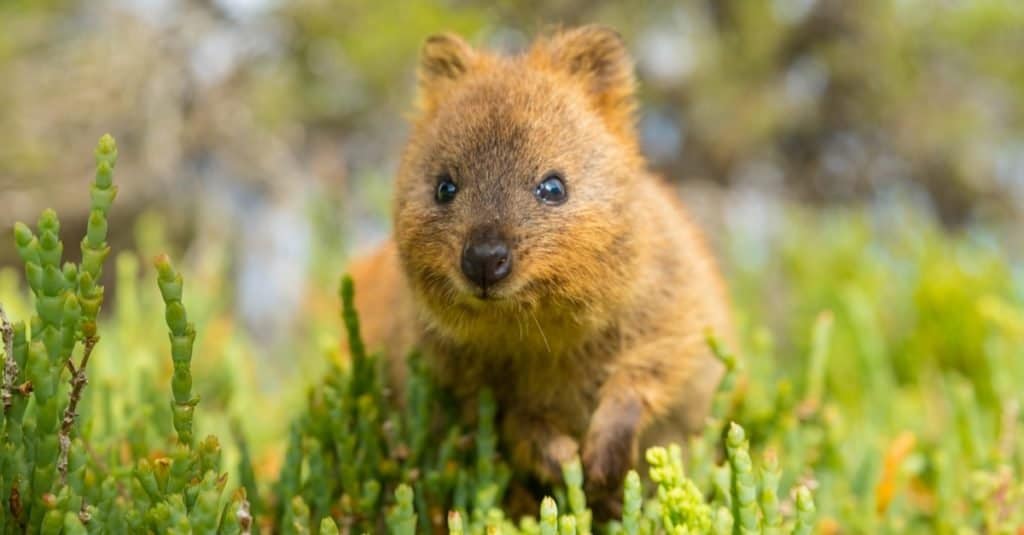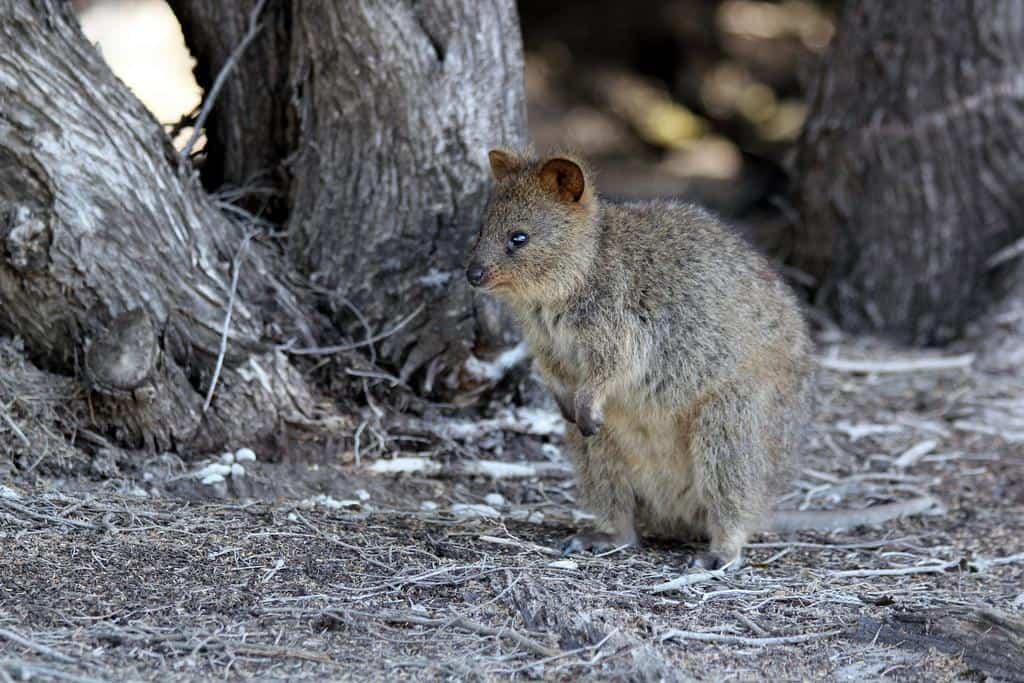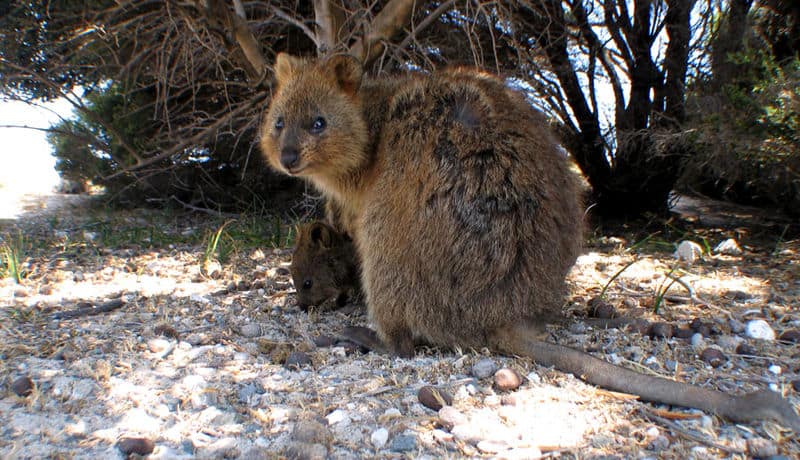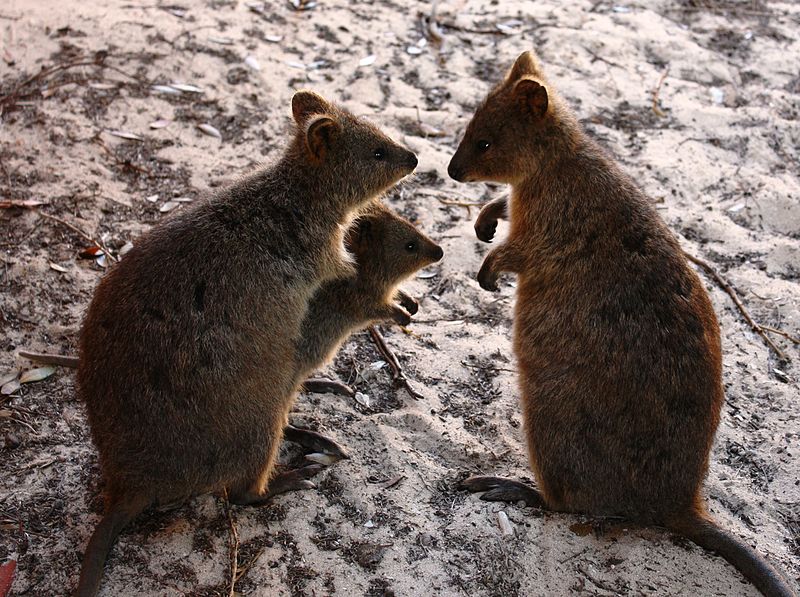The quokka is a peculiar yet adorable little creature that instantly captured the hearts of millions when it went viral for its seemingly permanent smile. It’s often referred to as “the world’s happiest animal” thanks to its docile, curious temperament, and jolly expression. If you also find them delightful, you’ve probably wondered at some point if quokkas could make good pets.
However, with wild animals (which the quokka most certainly is), the answer to that question is always a bit complicated. Read on to learn all about these unique marsupials and whether or not keeping them as pets is a good idea–or, for that matter, if it’s even legal.
What Are Quokkas?

Quokkas are marsupials native to Australia.
©Grakhantsev Nikolai/Shutterstock.com
The quokka, or the short-tailed scrub wallaby, is a small marsupial within the Macropodidae family. Their common name comes from the word “gwaga” in Australia’s Aboriginal Nyungar language. As macropods, quokkas are closely related to most other wallabies as well as kangaroos and pademelons.
As you might have guessed, quokkas are native only to Australia. More specifically, they reside in a small corner of the continent’s southwestern coast as well as a few small surrounding islands. They have established particularly sizeable populations on Rottnest Island and Bald Island. A Dutch sailor, Samuel Volckertzoon, originally documented quokkas in 1658. He initially believed the quokkas were wild cats!
In terms of their appearance, quokkas are short, rotund, and low to the ground, with rather stubby legs and comparatively large, round bodies for their size. Typical adults weigh in at around 5 to 10 pounds and are only about a foot tall.
Quokkas’ heads are also large and wide compared to their body size, with small, round ears and a short, triangular snout. Amusingly, their mouths have upturned corners, making them appear as if they are perpetually “smiling.”
The quokka’s dark brown fur is short, dense, and wiry. Like most other related marsupials, quokkas have pouches that they use to protect and carry around their babies.
Also similar to most marsupials, quokkas are nocturnal. During the day, they hide from predators like foxes and dingoes in dense foliage. At night, they become more active, climbing trees and seeking out vegetation to eat.
On average, quokkas live for around 8 to 12 years in the wild.
What Do Quokkas Eat?

These strange marsupials spend a lot of their time grazing in search of tasty plants to eat.
Quokkas are technically omnivores, but the vast majority of their diet consists of various types of local vegetation. They aren’t very picky eaters and will graze at night on most plants, vegetables, and fruits indiscriminately. During the day, they’ll usually hide out in the same vegetation they feed on for shelter.
Quokkas greatly enjoy eating all manner of grasses, leaves, succulents, seeds, roots, and shoots. While they will also feed on dying and dead vegetation if necessary, they strongly prefer fresh, new plant growth. Because they are semi-arboreal, they will often climb trees and pluck fruits like berries to eat. Despite their pudgy build, quokkas are agile and skilled at climbing.
Interestingly, in addition to plant matter, quokkas also occasionally eat a small number of insects and mollusks like snails and beetles. They sometimes will even eat small lizards, but this is quite rare.
Can You Legally Keep Quokkas as Pets?

The main reason why quokkas don’t make good pets is that it’s illegal to remove them from Australia.
Quokkas are heavily protected by Australian law. The IUCN currently classifies them as threatened. It is illegal to export them from their native habitat, harm them, or otherwise disturb their natural way of life in any way.
The Rottnest Island Authority Act outlawed the transport of quokkas (and various other species of native Australian wildlife) in 1987. According to the legislation, anyone who “interferes with wildlife on Rottnest Island” is subject to fines costing anywhere from $150 all the way up to $50,000 or more.
Even feeding the quokkas can get you a fine on the lower end of the spectrum. Meanwhile, exporting or outright abusing the animals in any way can entail a much larger fine well into the tens of thousands of dollars.
All this, unfortunately, means the quokka likely won’t be a viable pet for a very long time, if at all. But the legislation around these animals doesn’t exist for no reason–in fact, there are many valid reasons why you shouldn’t keep a quokka as a pet, even if the practice were perfectly legal. This brings us to…
Why Don’t Quokkas Make Good Pets?

Removing quokkas from their native habitat and depriving them of social interaction with other members of their species would be extremely ill-advised.
Quokkas are wild animals. They are not domesticated and thus do not fare well in captivity. They are highly social animals that need to be in contact with one another, and they have evolved and adapted to thrive in a very specific type of environment.
Additionally, the quokka’s numbers are already declining. Recklessly removing even more of them from their habitat would further interfere with their already fragile populations and drastically affect other areas of their local ecosystem.
Another important thing to note is that transporting quokkas out of their native habitat would be cruel and extremely stressful, if not fatal, for them. Even if an animal is normally very docile in the wild, placing them in captivity incorrectly can make them irritable and aggressive.
Essentially, the only people truly qualified to care for these animals in captivity are educated wildlife authorities and professionals working with facilities like zoos and sanctuaries.
These kinds of facilities are dedicated to replicating the quokka’s natural environment as closely as possible to hopefully breed them, raise funds and awareness to further support them, increase their numbers, and preserve the species in an informed, controlled, and responsible manner. They are far more knowledgeable and infinitely better equipped to raise wild animals than the typical exotic pet owner.
The photo featured at the top of this post is © Grakhantsev Nikolai/Shutterstock.com
Thank you for reading! Have some feedback for us? Contact the AZ Animals editorial team.






